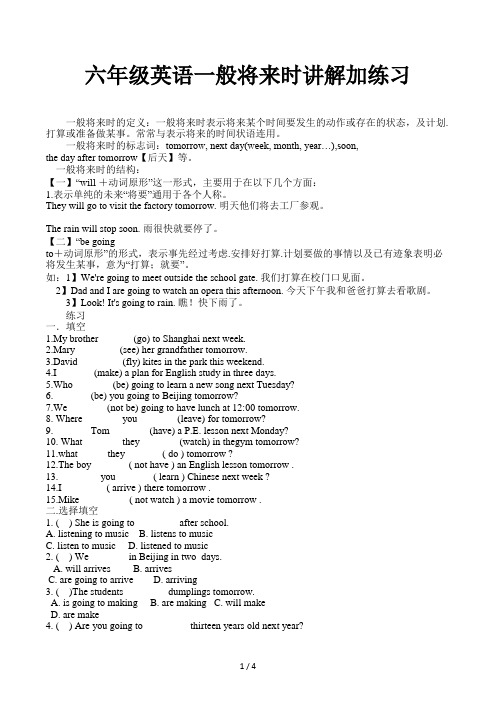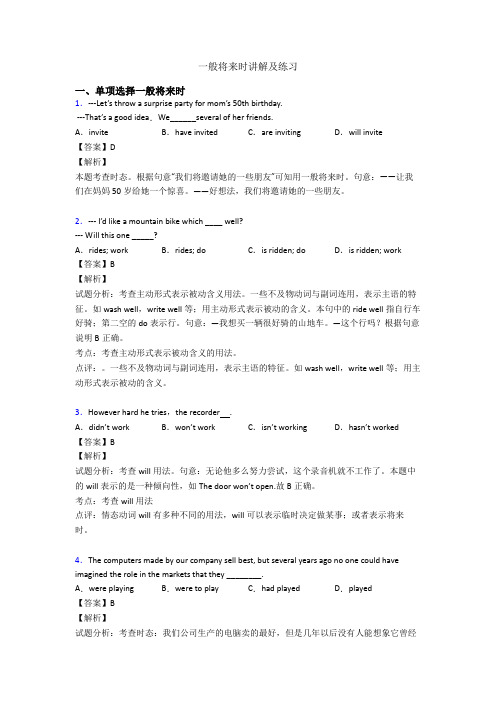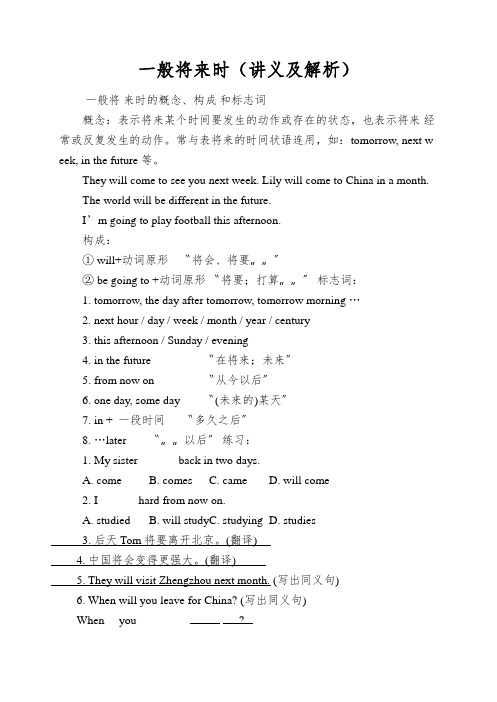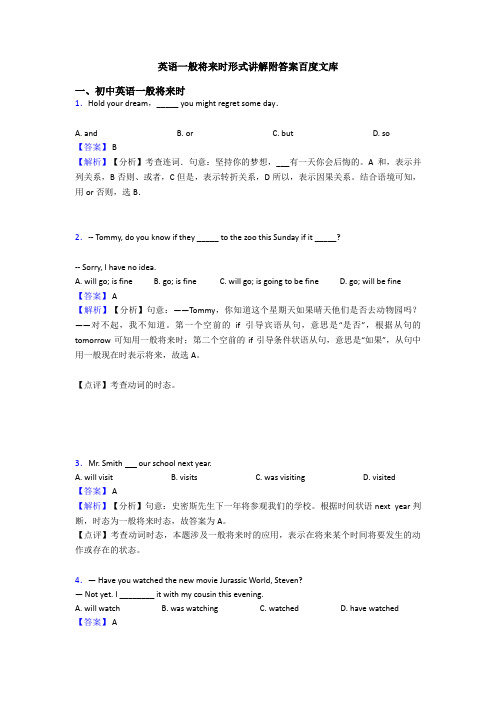一般将来时(讲义及答案)
六年级英语一般将来时讲解加练习

六年级英语一般将来时讲解加练习一般将来时的定义:一般将来时表示将来某个时间要发生的动作或存在的状态,及计划.打算或准备做某事。
常常与表示将来的时间状语连用。
一般将来时的标志词:tomorrow, next day(week, month, year…),soon,the day after tomorrow【后天】等。
一般将来时的结构:【一】“will +动词原形”这一形式,主要用于在以下几个方面:1.表示单纯的未来“将要”通用于各个人称。
They will go to visit the factory tomorrow. 明天他们将去工厂参观。
The rain will stop soon. 雨很快就要停了。
【二】“be goingto+动词原形”的形式,表示事先经过考虑.安排好打算.计划要做的事情以及已有迹象表明必将发生某事,意为“打算;就要”。
如:1】We're going to meet outside the school gate. 我们打算在校门口见面。
2】Dad and I are going to watch an opera this afternoon. 今天下午我和爸爸打算去看歌剧。
3】Look! It's going to rain. 瞧!快下雨了。
练习一.填空1.My brother ______ (go) to Shanghai next week.2.Mary ________ (see) her grandfather tomorrow.3.David ________ (fly) kites in the park this weekend.4.I_______ (make) a plan for English study in three days.5.Who _______ (be) going to learn a new song next Tuesday?6._______ (be) you going to Beijing tomorrow?7.We _______ (not be) going to have lunch at 12:00 tomorrow.8. Where _______ you _______ (leave) for tomorrow?9._______ Tom _______ (have) a P.E. lesson next Monday?10. What _______ they _______ (watch) in thegym tomorrow?11.what _____ they _______( do ) tomorrow ?12.The boy _______( not have ) an English lesson tomorrow .13.________ you _______( learn ) Chinese next week ?14.I ________ ( arrive ) there tomorrow .15.Mike _________ ( not watch ) a movie tomorrow .二.选择填空1. ( ) She is going to ________ after school.A. listening to musicB. listens to musicC. listen to musicD. listened to music2. ( ) We _______ in Beijing in two days.A. will arrivesB. arrivesC. are going to arriveD. arriving3. ( )The students ________ dumplings tomorrow.A. is going to makingB. are makingC. will makeD. are make4. ( ) Are you going to_________ thirteen years old next year?A. will beB. areC. beD. go5. ( ) ___will see a play in 5 days?A. WhenB. WhatC. WhoD. Whose6. ( ) Mary______ English next year.A. will learnB. will to learnC. are going to learn.D. learns7. ( ) He’ll _____ shopping this afternoon.A. goingB. goC. goesD. went8. ( ) Will you ____ at the bus stop at 10:30?A. meetingB. meetsC. meetD. met9. ( ) Lily and I _______ the guitar. next week.A. am going to playB. are going to playC. will playsD. play10. ( ) How ______ Jenny ___ home tomorrow?A. does......goB. is……goingC. will……goD. do……g o11. ( ) Who is going to _________ a song ?A. sings B singing C. to sing D. sing12. ( ) I _________in Beijing in three days.A. are going to arriveB. arriveC. will arriveD. arrives13. ( ) He _______some model planes tomorrow .A. going to makeB. is makingC. will make D makes14. ( ) Are you going to ___________a doctor next year ?A. will beB.. areC. beD. are going to15. ( ) She ________ you make supper this evening .A. helpsB. will helpC. is helpingD. is going help三.把下列句子变成一般疑问句,并给出肯定和否定回答。
一般将来时(讲义)人教PEP版英语六年级下册

英语学科辅导讲义
一般将来时
1.一般将来时的定义:表示将来某一时刻的动作或状态,或将来某一段时间内经常的动作或状态
2.时间标志词:
1)tomorrow, the day after tomorrow, tomorrow morning/afternoon/evening
2)next year/week/month/hour/day/century the year after next(后年)
3)in+一段时间(★★★★★)
4)in the future
5)this afternoon/Sunday/evening
6)from now on
7)one day, someday (未来的)某天
8 )soon (★★★★★)
3.结构
主语+shall/will+ do+其他(shall用于第一人称I/we)客观上将要
主语+be going to do 人作主语,打算做某事、推测天气
主语+ be going to + do+其他
这种结构常用来表达事先考虑过打算要做的事以及已有迹象表明必将要发生的某事,意为“打算;就要”。
注意:be 动词要与主语的人称和数一致
如:I am going to read some books tomorrow.
Look! It's going to rain.
★使用be going to 结构应注意的两点
There be 句型的be going to 结构为:There is going to be... (注意句型中going to 后面的be 不能改为。
一般将来时态讲义及练习题

一般将来时态(The future indefinite tense)讲义及练习题一、什么叫做一般将来时(1)一般将来时表示将要发生的动作或情况。
例如:I will(shall) arrive tomorrow.我明天到。
Will you be free tonight? 你今晚有空吗?We won’t (shan’t) be busy this evening. 我们今晚不忙。
(2)在一般将来时的句子中,有时有表示将来时间的状语,有时没有时间状语,这时要从意思上判断是否指未来的动作或情况。
例如:Will she come? 她(会)来吗?We’ll only stay for two weeks. 我们只待两星期。
The meeting won’t last long. 会开不了多久。
表示未来的时间状语tomorrow明天,next year明年,from now on从现在起,in a month一个月之后,in the future 将来,等。
today今天,this evening今天晚上,this week这个星期,this month这个月,this year今年,等。
二、一般将来时的用法一般将来时的用法(1)在以第一人称I或we作主语的问句中,一般使用助动词shall,这时或是征求对方的意见(a),或是询问一个情况(b)。
will用于第二、三人称。
除英国外的说英语的国家,在陈述句中,即使在第一人称一般也用will,在英国也有这种趋势。
在口语中,常用shall, will的缩写形式为’ll, 如:I’ll, you’ll等。
Shall not的缩写式为:shan’t, wi ll not 的缩写式为:won’t.肯定句:I/We shall/will go.You/He/She/They Will go.否定句:I/We shall/will not go.You/He/She/They Will not go.疑问句:Shall I/we go?Will you/he/she/they go?:( a). Where shall we meet? 我们在哪儿碰头?(b). Shall we have any classes tomorrow?明天我们有课吗?在这类问句中,近年来也有不少人用will,特别是在美国。
一般将来时讲解及练习

一般将来时讲解及练习一、单项选择一般将来时1.---Let’s throw a surprise party for mom’s 50th birthday.---That’s a good idea.We______several of her friends.A.invite B.have invited C.are inviting D.will invite【答案】D【解析】本题考查时态。
根据句意“我们将邀请她的一些朋友”可知用一般将来时。
句意:——让我们在妈妈50岁给她一个惊喜。
——好想法,我们将邀请她的一些朋友。
2.--- I’d like a mountain bike which ____ well?--- Will this one _____?A.rides; work B.rides; do C.is ridden; do D.is ridden; work【答案】B【解析】试题分析:考查主动形式表示被动含义用法。
一些不及物动词与副词连用,表示主语的特征。
如wash well,write well等;用主动形式表示被动的含义。
本句中的ride well指自行车好骑;第二空的do表示行。
句意:—我想买一辆很好骑的山地车。
—这个行吗?根据句意说明B正确。
考点:考查主动形式表示被动含义的用法。
点评:。
一些不及物动词与副词连用,表示主语的特征。
如wash well,write well等;用主动形式表示被动的含义。
3.However hard he tries,the recorder .A.didn’t work B.won’t work C.isn’t working D.hasn’t worked【答案】B【解析】试题分析:考查will用法。
句意:无论他多么努力尝试,这个录音机就不工作了。
本题中的will表示的是一种倾向性,如The door won’t open.故B正确。
一般将来时(讲义及解析)

一般将来时(讲义及解析)一般将来时的概念、构成和标志词概念:表示将来某个时间要发生的动作或存在的状态,也表示将来经常或反复发生的动作。
常与表将来的时间状语连用,如:tomorrow, next w eek, in the future 等。
They will come to see you next week. Lily will come to China in a month.The world will be different in the future.I’m going to play football this afternoon.构成:① will+动词原形〝将会、将要……〞② be going to +动词原形〝将要;打算……〞标志词:1. tomorrow, the day after tomorrow, tomorrow morning …2. next hour / day / week / month / year / century3. this afternoon / Sunday / evening4. in the future 〝在将来;未来〞5. from now on 〝从今以后〞6. one day, some day 〝(未来的)某天〞7. in + 一段时间〝多久之后〞8. …later 〝……以后〞练习:1. My sister back in two days.A. comeB. comesC. cameD. will come2. I hard from now on.A. studiedB. will studyC. studyingD. studies3. 后天 Tom 将要离开北京。
(翻译)4. 中国将会变得更强大。
(翻译)5. They will visit Zhengzhou next month. (写出同义句)6. When will you leave for China? (写出同义句)When you ?句式变换She will be angry with him.否定句:She will not be angry with him. /She won’t be angry with him.一般疑问句:Will she be angry with him? 回答:Yes, she will. / No, she won’t. 特殊疑问句:Who will she be angry with?注意:will 可缩写为’ll,will not 可缩写为 won’t /wəʊnt/练习:1. 这个周末他不会去钓鱼。
英语一般将来时形式讲解附答案百度文库

英语一般将来时形式讲解附答案百度文库一、初中英语一般将来时1.Hold your dream,_____ you might regret some day.A. andB. orC. butD. so【答案】 B【解析】【分析】考查连词.句意:坚持你的梦想,___有一天你会后悔的。
A和,表示并列关系,B否则、或者,C但是,表示转折关系,D所以,表示因果关系。
结合语境可知,用or否则,选B.2.-- Tommy, do you know if they _____ to the zoo this Sunday if it _____?-- Sorry, I have no idea.A. will go; is fineB. go; is fineC. will go; is going to be fineD. go; will be fine【答案】 A【解析】【分析】句意:——Tommy,你知道这个星期天如果晴天他们是否去动物园吗?——对不起,我不知道。
第一个空前的if引导宾语从句,意思是“是否”,根据从句的tomorrow可知用一般将来时;第二个空前的if引导条件状语从句,意思是“如果”,从句中用一般现在时表示将来,故选A。
【点评】考查动词的时态。
3.Mr. Smith our school next year.A. will visitB. visitsC. was visitingD. visited【答案】 A【解析】【分析】句意:史密斯先生下一年将参观我们的学校。
根据时间状语next year判断,时态为一般将来时态,故答案为A。
【点评】考查动词时态,本题涉及一般将来时的应用,表示在将来某个时间将要发生的动作或存在的状态。
4.— Have you watched the new movie Jurassic World, Steven?— Not yet. I ________ it with my cousin this evening.A. will watchB. was watchingC. watchedD. have watched【答案】 A【解析】【分析】句意:你看过《侏罗纪世界》这部新电影吗,史蒂文? ——没有。
初中英语一般将来时讲解与练习(含答案)

一般将来时讲解与练习一、概念:一般将来时表示将来某个时间要发生的动作或存在的状态,及计划、打算或准备做某事。
常常与表示将来的时间状语连用。
如:tomorrow,next day(week, month, year…),soon,the day after tomorrow(后天)等。
二、常用的表达形式共有五种,现归纳如下:(一)“will +动词原形”这一形式,主要用于在以下几个方面:1、表示单纯的未来“将要”通用于各个人称。
eg:They will go to visit the factory tomorrow. 明天他们将去工厂参观。
I’ll come with Wang Bing and Yang Ling. 我将和王兵、杨玲一起来。
The rain will stop soon. 雨很快就要停了。
2、表示不以人的意志为转移的自然发展的未来的事。
eg:Today is Saturday. Tomorrow will be Sunday. 今天是星期六。
明天是(将)是星期日。
He will be thirty years old this time next year. 明年这个时候他就(将)三十岁。
3、问对方是否愿意做某事或表示客气地邀请或命令。
eg: Will you please turn on the radio? 请打开收音机好吗?Will you go to the zoo with me? 你和我一起去动物园好吗?Shall we go there at five? 我们五点钟去那儿,好吗?Will you please open the door? 请你把门打开,好吗?注:在口语中will用于所有人称,书面语中第一人称常用shall。
(二)“be going to+动词原形”的形式,表示事先经过考虑、安排好打算、计划要做的事情以及已有迹象表明必将发生某事,意为“打算;就要”。
一般将来时讲解(附习题+答案)

一般将来时讲解(附习题+答案)一、一般将来时的含义:表示动作发生在将来二、一般将来时的句型:(1) will/shall+动词原形(2) be going to+动词原形三、一般将来时的时间状语:tomorrow(明天)、the day after tomorrow(后天)、next...(下一...): next week(下一周)、next year(明年)、next month(下个月)in+一段时间(...之后): in three days(三天之后)、in the future在未来this evening(今天晚上)四、一般将来时的句型结构:(1) will/shall+动词原形(will not =won’t)(will 各种人称均可用,shall 只能用于第一人称)1)肯定句:主语+will/shall+动词原型...如:I will go to school tomorrow.我明天将会去学校He will go to school tomorrow.他明天将会去学校。
2)否定句:主语+will/shall+not+动词原型...如:I won’t go to school tomorrow.我明天将不会去学校。
He won’t go to school tomorrow.他明天将不会去学校。
3)一般疑问句:Will/Shall +主语+动词原型...如:Will you go to school tomorrow?你明天要去学校吗?Will he go to school tomorrow?他明天要去学校吗?肯定回答:Yes, 主语+will.如:Yes, I will.Yes, he will.否定回答:No,主语+will+not.如:No, I won’t.No, he won’t.4) 特殊疑问句:特殊疑问词+will/shall+主语+动词原型...如:What will you do tomorrow?你明天将会做什么?What will he do tomorrow?他明天将会做什么?(2) be going to+动词原形1)肯定句:主语+be going to +动词原型...如:I am going to buy some books tomorrow.我明天打算去买一些书。
- 1、下载文档前请自行甄别文档内容的完整性,平台不提供额外的编辑、内容补充、找答案等附加服务。
- 2、"仅部分预览"的文档,不可在线预览部分如存在完整性等问题,可反馈申请退款(可完整预览的文档不适用该条件!)。
- 3、如文档侵犯您的权益,请联系客服反馈,我们会尽快为您处理(人工客服工作时间:9:00-18:30)。
一般将来时(讲义)一般将来时的概念、构成和标志词概念:表示将来某个时间要发生的动作或存在的状态,也表示将来经常或反复发生的动作。
常与表将来的时间状语连用,如:tomorrow, next week, in the future 等。
They will come to see you nextweek. Lily will come to Chinain a month.The world will be different inthe future.I’m going to play football thisafternoon.构成:① wil l+动词原形“将会、将要……”;② be going to +动词原形“将要;打算……” 标志词:1. tomorrow, the day after tomorrow, tomorrowmorning …2. next hour / day / week / month /year / century3. this afternoon / Sunday /evening4. in the future “在将来;未来”5. from now on“从今以后”6. one day, some day “(未来的)某天”7. in + 一段时间“多久之后”[8. …lat er “……以后”练习:1. My sister backin two days.A. comeB. comesC. cameD. will come2. I hardfrom now on.A. studiedB. will studyC. studyingD. studies3. 后天Tom 将要离开北京。
(翻译)4. 中国将会变得更强大。
(翻译)5. They will visit Zhengzhou next month. (写出同义句) |6. When will you leave for China (写出同义句)When you句式变换She will be angry with him.否定句:She will not be angry with him. /She won’t be angry with him.一般疑问句:Will she be angry withhim 回答:Yes, she will. / No, shewon’t. 特殊疑问句:Who will she beangry with注意:will 可缩写为’l l,will not 可缩写为won’t /wəʊnt/练习:1. 这个周末他不会去钓鱼。
He go .2. 下个月她要来郑州吗Will she3. I will become a teacher next year. (变为一般疑问句)4. I will become a teacher next year. (就划线部分提问)注意1. 在表示“带意愿色彩的将来”时,常用助动词will。
如:I will tell you all about it.2. 疑问句中,主语是第一人称 I 或 we 时,常用助动词shall。
如:When shall we have the partyWhen and where shall we meet3. 书面语中,主语是第一人称I 或we 时,常用助动词shall。
如:I shall write you a letter next month.但在口语中所有人称都可以用will。
4. will 常缩略为’ll,will not 常缩略为won’t 。
如:I’ll go there.I won’t go there.there be 句型的一般将来时1. will 放在there be 中构成there will b e…,表“某时/某地将要有……”There will be a sports meeting in ourschool. There will be two basketballmatches next week.2. 句式变换There will be a film this evening.否定句:There won’t be a film this evening.一般疑问句:Will there be a film thisevening 回答:Yes, there will. / No,there won’t. 特殊疑问句:When willthere be a film 练习:1. 动物园将要有一场表演。
(翻译)2. There will be many visitors tomorrow. (变为一般疑问句并进行否定回答)3. There will be two football matches tomorrow. (就划线部分提问) Exercises一、单选( )1. Put your hands behind your back. Don’t speak. We’ll in ten minutes.A. backB. be backC. are backD. are back to you( )2. My parents will come back three hours.A. onB. inC. nextD. at( )3. Two weeks he will leave for Beijing.A. inB. afterC. laterD. behind( )4. I’m s orry I left the book at home. I it here tomorrow,I promise.A. bringB. will bringC. broughtD. brings( )5. He very busy now, but he free this afternoon.A. will be; isB. is; isC. will be; will beD. is; will be( )6. They any classes next week.A. hadB. haveC. will haveD. won’t have( )7. I hope your dream _ true one day.A. comeB. comesC. will comeD. came( )8. This term over. The summer vacation iscoming in two weeks.A. isB. wasC. willD. will be( )9. Mary here next month.A. isn’t workB. doesn’t workC. isn’t going to workingD. won’t work( )10. —When you reading the book—It’s hard to say. I’m busy recently.A. did; finishB. do; finishC. will; finishD. is; finished( )11. —Where is Mr. Lee I have something important to tell him.—You find him here. He has gone to (去了) Japan.A. won’tB. don’tC. aren’tD. didn’t( )12. There a football match and a concert this weekend.Which one would you like to goA. isB. areC. will beD. will have( )13. “There a meeting next Tuesday.” means “Theya meeting next Tuesday.”A. will be; will beB. will have; will haveC. will be; will haveD. will have; will be( )14. —Will there be any paper money in 100 years—. Everyone will have a credit card.A. Yes, there isB. No, there isn’tC. Yes, there willD. No, there won’t( )15. —you free tomorrow—No. I free the day after tomorrow.A. Are; going to; willB. Are; going to be; willC. Are; going to; will beD. Are; going to be; will be二、完成句子16. He flew a kite with Tom last weekend. (用next weekend 改写句子)17. I will be a reporter. (写出同义句)I _ a reporter.18. She will go abroad next year. (改为否定句)19. They will meet at school. (就划线部分提问)20. 后天有一场电影。
(翻译)【参考答案】一般将来时的概念、构成和标志词练习:1. D2. B3. Tom will leave Beijing the day after tomorrow.4. China will become stronger.5. They are going to visit Zhengzhou next month.6. are; going to leave for China句式变换练习:1. won’t; fishing this weekend2. come to Zhengzhou next month3. Will you become a teacher next year4. What will you become nextyear There be 句型的一般将来时练习:1. There will be a show in the zoo.2. Will there be many visitors tomorrowNo, there won’t.3. How many football matches will there be tomorrow Exercises一、1—5:BBCBD 6—10:DCDDC 11—15:ACCDD二、16. He will fly a kite with Tom next weekend./ He is going to fly a kite with Tom next weekend.17. am going to be / am going to become18. She won’t go abroad next year.19. Where will they meet20. There will be a movie the day after tomorrow./ There is going to be a movie the day after tomorrow.>。
